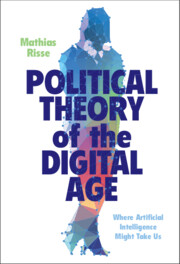Book contents
- Political Theory of the Digital Age
- Political Theory of the Digital Age
- Copyright page
- Dedication
- Contents
- Preface
- Acknowledgments
- 1 Introduction
- 2 Learning from the Amish
- 3 Artificial Intelligence and the Past, Present, and Future of Democracy
- 4 Truth Will Not Set You Free: Is There a Right to It Anyway?
- 5 Knowing and Being Known
- 6 Beyond Porn and Discreditation
- 7 The Fourth Generation of Human Rights: Epistemic Rights in Life 2.0 and Life 3.0
- 8 On Surveillance Capitalism, Instrumentarian Power, and Social Physics
- 9 Data as Social Facts: Distributive Justice Meets Big Data
- 10 God, Golem, and Gadget Worshippers: Meaning of Life in the Digital Age
- 11 Moral Status and Political Membership: Toward a Political Theory for Life 3.0
- Epilogue
- Bibliography
- Index
11 - Moral Status and Political Membership: Toward a Political Theory for Life 3.0
Published online by Cambridge University Press: 02 February 2023
- Political Theory of the Digital Age
- Political Theory of the Digital Age
- Copyright page
- Dedication
- Contents
- Preface
- Acknowledgments
- 1 Introduction
- 2 Learning from the Amish
- 3 Artificial Intelligence and the Past, Present, and Future of Democracy
- 4 Truth Will Not Set You Free: Is There a Right to It Anyway?
- 5 Knowing and Being Known
- 6 Beyond Porn and Discreditation
- 7 The Fourth Generation of Human Rights: Epistemic Rights in Life 2.0 and Life 3.0
- 8 On Surveillance Capitalism, Instrumentarian Power, and Social Physics
- 9 Data as Social Facts: Distributive Justice Meets Big Data
- 10 God, Golem, and Gadget Worshippers: Meaning of Life in the Digital Age
- 11 Moral Status and Political Membership: Toward a Political Theory for Life 3.0
- Epilogue
- Bibliography
- Index
Summary
I introduce a distinction between “slow and relatively harmonious” and “fast and radical” as far as the integration of AI into human life is concerned. Regarding the “slow and relatively harmonious” scenario, I explore a set of questions about how it would make sense for humans to acknowledge some such status in machines. But we must also ask whether self-conscious artificial intelligences would be morally equivalent to humans. I do so by asking what an increase in moral status for machines means for the political domain. Chapter 3 explored why AI would affect the democratic process in the near future. Here our concern is with a scenario further along. One question is whether there is a cognitive capacity beyond intelligence and self-consciousness that is needed for involvement in the political domain. Paying attention to what is appropriate to say about animals in that regard is useful. As far as the “fast and radical” scenario is concerned, I first explore why philosophically we are so dramatically unprepared to deal with an intelligence explosion, with a focus on what kind of moral status superintelligences might acknowledge in us. Finally, I attend to Tegmark’s discussion of political scenarios that could arise after an intelligence explosion and add a public-reason scenario that could offer a vision for a political context shared between humans and superintelligences.
- Type
- Chapter
- Information
- Political Theory of the Digital AgeWhere Artificial Intelligence Might Take Us, pp. 231 - 254Publisher: Cambridge University PressPrint publication year: 2023

